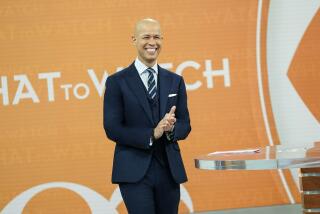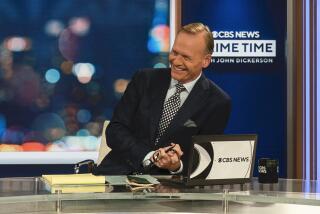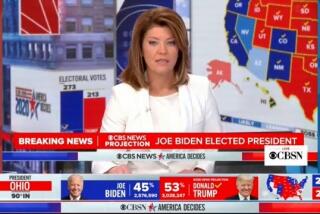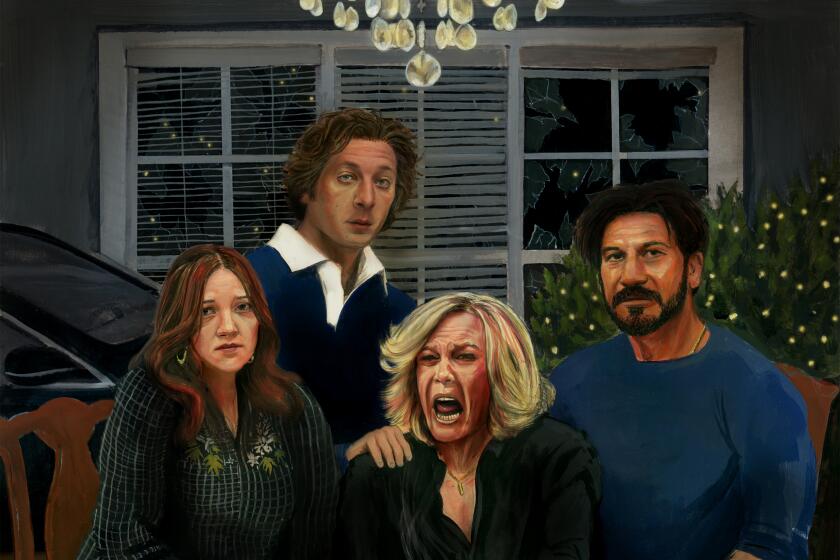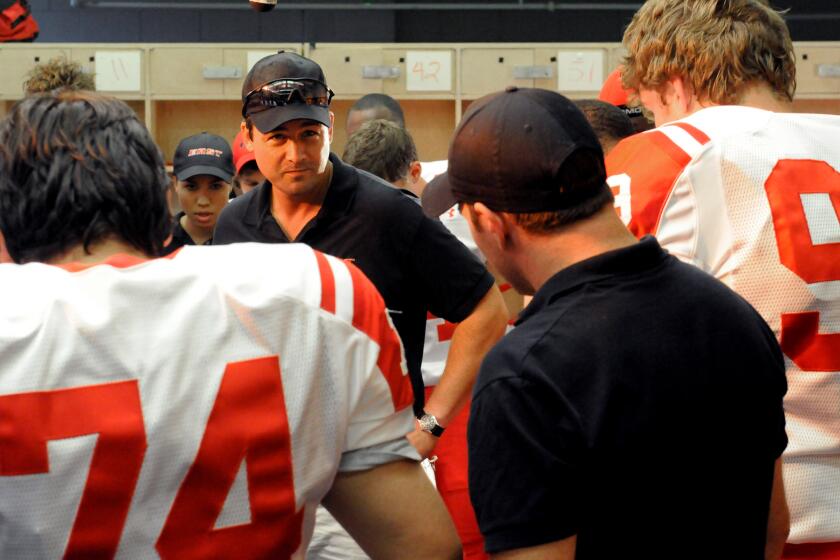Q&A: CBS anchor Scott Pelley says Web users look to the evening news for the truth
Scott Pelley says he’s been hearing predictions that the network evening newscast is doomed ever since he arrived at CBS 27 years ago. So he’s feeling pretty good about the fact that the “CBS Evening News” has actually gained viewers since he became anchor on June 6, 2011, taking over for Katie Couric, who left the network.
Pelley’s broadcast averaged 7.4 million viewers in the 2015-16 TV season, up 1.4 million over the last five years. “CBS Evening News” still ranks third behind “NBC Nightly News With Lester Holt” (9.1 million viewers) and “ABC World News With David Muir,” (8.6 million), but has seen more audience growth than its competitors over that time span.
See the most-read stories this hour >>
Celebrating his fifth anniversary in the anchor chair, Pelley, 58, recently shared a few thoughts on why the format made famous by Walter Cronkite and the Huntley-Brinkley Report is holding its own at a time when viewers have plenty of other choices for video news.
The Internet was supposed to kill the network evening newscast. But you think it’s helped. Why?
We live in this age now where never before in human history has more information been available to more people and that’s wonderful. It’s also a time when never has there been more bad information available. I believe the evening news broadcast is growing as much as it is because people see and hear things all day long and at the end of the day they say – well, what really happened? Did Donald Trump really say that? Was ISIS in Iraq? They turn to a brand name, such as CBS News, that they can trust to verify what they’ve been seeing and hearing all day [especially] as more news sources that people have never heard of pop up on the Internet.
Is it also helping that cable news channels now go deep on topics and do fewer summaries of the day’s events?
That’s right. I think the audience is very busy whether they are working or at school. We provide an efficient, well-informed digest of the 12 or so most important things that happened in the world today. Our goal is to do that in a way so that at the end viewers say “that was worth my time.”
“CBS Evening News” recently introduced a new opening and theme music. That doesn’t happen very often. Why now?
I think it was done because they’re trying to make me cool. Coming off of that intro quickens my read a little bit on the broadcast. It charges you up with some energy.
With all those fast-cutting images it looks like the opening has taken a little DNA from the popular “Eye Opener” segment that starts off “CBS This Morning.”
It has that kind of pace to it. You’re the first person to describe it to me that way. I think you’re right. It gets the broadcast off to a rapid start and editorially gives the audience an idea of what they are about to see.
You were a correspondent for a long time before becoming an anchor and managing editor of “CBS Evening News.” After five years in the job, what has been the biggest adjustment?
I had never been involved in managing a newsroom before. Before I just had a dozen people who worked on my team at “60 Minutes.” Then I came over here and I was helping to manage hundreds of people all around the world. It took me a little bit of time to get my arms around that and understand how to do that properly. How to listen to people and incorporate their ideas into the larger conversation that we’re having in the newsroom and the broadcast. And to make sure every person feels valued.
Every TV newsroom has debated how much time to devote to covering Donald Trump’s presidential campaign. What has the conversation been like at “CBS Evening News”?
What we’re trying not to pay a lot of attention to are the rhetorical flourishes of Trump, or Hillary Clinton for that matter. We want to pay attention to -- what are their policies and how do they contrast? I think that’s our most important role. On cable channels and elsewhere they are placing, in my view, too much emphasis on the rhetoric and not enough emphasis on “How would you build that wall?” “How would you round up 11 million people and send them out of the country?” Or in Hillary Clinton’s case, “How do you change Obamacare without destroying it?” We’re trying to do more issue-oriented stories.
You’ve always talked about how important the legacy of CBS News is to you. Has the loss of your “60 Minutes” colleagues over the years – most recently Morley Safer – been tough for you?
Bob Simon not only taught me how to write, he taught me what writing could be. I went to school with Morley on producing beautifully rich and detailed feature stories. Sitting here in my office speaking with you, I’m looking at pictures on my wall of Mike Wallace, Don Hewitt, Morley and Walter Cronkite -- all men that I knew personally and I learned a great deal from. As they have passed, you begin to feel in my position an enormous weight of responsibility to make sure that everything that was great about their talents gets taught to the young people who never got a chance to know them. I’m now the intermediary between these greats and the terrific young people we’re hiring in the newsroom. I’m their touchstone, if you will. I want to make sure I’ve taught some of those lessons I’ve learned to the people who are coming up.
Follow @SteveBattaglio on Twitter
MORE FROM ENTERTAINMENT
‘UnREAL’ goes where real reality dares not tread in second season
Muhammad Ali: America’s first and last Muslim hero
‘Turtles’ take over box office, ‘Me Before You’ surprises and ‘Popstar’ doesn’t pop
More to Read
From the Oscars to the Emmys.
Get the Envelope newsletter for exclusive awards season coverage, behind-the-scenes stories from the Envelope podcast and columnist Glenn Whipp’s must-read analysis.
You may occasionally receive promotional content from the Los Angeles Times.
